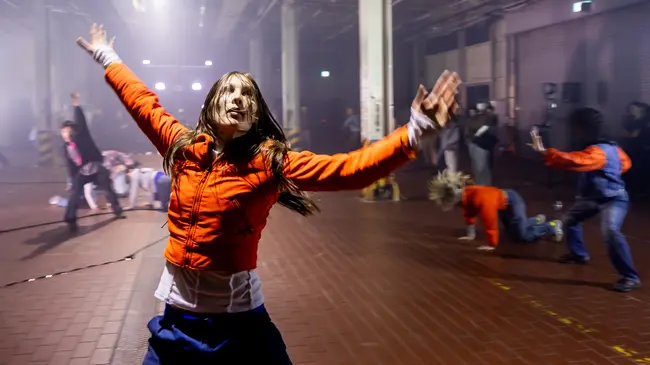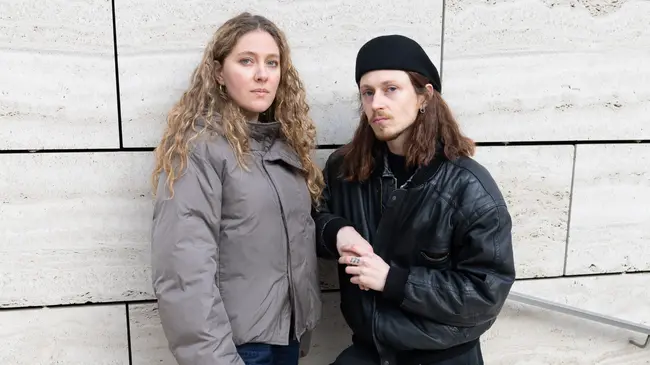Our parents taught us how to be good travellers

With Travels On Papers, Mu.ZEE exhibits the travel log of visual artist and painter Joris Ghekiere. All of the works shown were created while travelling through Asia between 1990 and 1992 with his wife Inge Henneman. They both translated their impressions to paper: Joris in the form of drawings and paintings, Inge via her writings. Not yet born at the time, their sons Abel and Orlan Ghekiere - now both young emerging musicians - grew up on the stories of that trip and completely embody them while showing us around the exhibition. Abel released a spherical and tender multi-instrument album last year, while jazz-drummer Orlan will drop a solo electronic travel diary in March, and it’s clear they share one big source of inspiration: the world around them in all its noise. ‘We got that from our dad.’ The two agree. Each with a cup of black coffee, they reminisce on their upbringing and its influence, as well as talk about their prospecting projects.
Abel and Orlan, you've known each other your whole lives. Can you introduce each other to me?
Abel: This is Orlan Ghekiere, who grew up in Klein Willebroek. He is now studying jazz drums at the Antwerp Conservatory. I know few people who are more loved by those around them than Orlan. He is very passionate about drumming, and he is also very good at it! He’s always looking for new ways to find structure in his music.
Orlan: This is Abel Ghekiere, 26 years old, which means he can't use the youth train passes anymore. Also raised in Klein Willebroek, he is now a PhD student investigating discrimination in housing. Besides being an intellectual genius, he is also an incredible musician. I don’t know many untrained musicians who have such an extraordinary sense of sound. He is also, not unimportantly, a warm and pleasant person to be around.
You both started playing your chosen instrument late if my memory serves.
O: I started with piano in music school, and switched to drums in my last two years of training. After high school, I did the 7th year program at Kunsthumaniora Brussels and went to study at the conservatory in Antwerp the following year. Now I'm in my 2nd year of my master's.
A: I also did the 7th year at the Kunsthumaniora in Brussels. I was very insecure about what I wanted to do after high school. I first wanted to do classical guitar, but at the last moment, I chose jazz. After that year, I realised that although I really liked it, I also found it very scary. I wasn't really looking forward to five years of studying your instrument. I wanted to learn more about the world than the conservatory could offer. So I began studying social-economic sciences.
You are still making music. Did Joris' profession influence you in your decision to go into art?
A: We wanted to be artists, because we saw our dad doing cool things, like painting for a whole day. But he didn't allow us to do that. He made it very clear to us that he was an exception to the rule, someone who could make a living from his art. He wanted to protect us, I think. It didn't quite work out after all. [Laughs]
"We wanted to be artists because we saw our dad doing cool things"
O: I started at Kunsthumaniora Brussels right after Joris died. He said: ‘If you really want to become a musician, you should go to the conservatory. You have to go for it straight away.’ Back then, I approached the 7th year as a buffer year, I didn't really know what I wanted to do with that. Throughout our upbringing, I became very inspired by the music that was playing in our house, for example. The White Stripes, Aphex Twin and David Bowie coloured our childhood. As a rebellious adolescent, I left that music behind me at first, but it found me again and set the tone for my taste in music.
A: And also the way you make music now. I learnt from Joris how to look at things and how to develop a unique view of the world. Orlan and I share that too, I think.
I learnt from Joris how to look at things and how to develop a unique view of the world
Can you talk a bit more about that view of the world?
A: Our parents taught us how to be good travellers. You have to learn to allow everything to inspire you, and it takes practice processing those impressions. Orlan and I both express these in music. My record Voor Het Verdwijnt, En Daarna, holds a lot of my internalised grief and sorrow, but through music, I found a way to give place to those feelings and let them out. I use field recordings a lot, which also allows you to take something from the world and then give it your own twist. Orlan went on a trip through Pakistan last year, a road that our parents also travelled. He came back with an SD card full of music and sounds from his trip.
O: That way of creating, that way of looking at the world, we share with our parents. They expressed it in painting and writing, and we in music. People who listen to your music, Abel, often feel, without knowing what it's about, those feelings that you have incorporated into it. You bring them to your precious places, through your music.
A: Like in this exhibition, Joris brings us to his precious places. I often feel myself travelling with them.
That way of creating, that way of looking at the world, we share with our parents
Did you hear those travel stories throughout your childhood?
A: We heard both their stories and we created new ones with the whole family. Our parents gave us a huge gift: they took us travelling from the time we were little.
O: I'm very grateful to them for that gift, because we’ve seen the most beautiful places, and they’ve shaped us as people. That's where we learned how to look.
A: Dad was a very visual person, and he always found beauty in the commonplace. We inherited that point of view.
Abel, What was that like creating your album Voor Het Verdwijnt, En Daarna?
A: When we lost Joris, that grief was very physical. I felt a block in my body all the time. That block can get out through talking about it, or, in Orlan's case, through drumming. My way of giving a voice to that feeling was to pour that sadness into my compositions. All the compositions featured on the record are very intuitive, and no song was ever worked on for longer than an hour or two. They are all instantaneous expressions of large feelings. I knew how to play the guitar, but I fell in love with the sound of the clarinet. A good friend lent me a clarinet, which was an influential discovery because that physical sadness could suddenly have a corresponding expression. I had to blow and blast and breathe correctly to get a sound out of the clarinet. It's a very personal album, which is why at first I thought I wasn't going to do anything with it.
I made 10 CDs for my friends and family, as a way of saying, ‘Sorry I'm not around often, but I made this.’ Joris’ best friend often listened to that album in his atelier, and on one of those listening sessions, the director of Rotkat Records came in there, and that's when the ball started rolling. Rotkat very respectfully searched with me for ways we could release it while maintaining its intimacy. Then along came live performances. It was clear from the start that the band had to consist of people close to me. Suddenly we had to rehearse and, just as suddenly, I found myself having to lead a band.
The compositions featured on the record are very intuitive, they are instantaneous expressions of large feelings"
What was it like for you, Orlan, to play the drums in that project?
O: I found it extraordinary to discover what Abel's music did to me. My grief was transformed by the music. I am very grateful to Abel for that. That music is continuing to grow. It started as very intimate dark music, but the more frequently we played it, the better we got to know each other musically and were able to bring in some lightness and clarity. During those first concerts, we came off stage and we were all crying, and so was the audience.
A: After that, we started to add a lot more improvisation and put an emphasis on musicality. That way it’s also doable for us, and not emotionally draining each time.
Orlan, you are also working on a music project, which is supposed to come out in March. Can you give us a little peek at what that is gonna look like?
O: I'm going to release my first album soon. It's a very special one because it's music I've been making for years which has grown up with me. It will be mainly electronic music. I proceeded very much as Joris operated on his travels: every place I've been and everything I've seen and heard is contained in this record. It’s a collage of impressions I have gathered over the past few years, and also a kind of travel journal. I want to recreate spheres and moods that have had a great influence on my personal development. Through my music, I want to guide people to those places and those moments.
I used a lot of field recordings, plucking things from the real world, and then putting them into a whole different context. They are transformed into a different texture and musically interact with your memories. That's a tactic Abel and I share, yet the result is always very different. So in March, the album will be released on Azur Editions, a record label Abel founded together with Ezra Babski. There will be a small release party, with a performance. It's going to be a great night.
Does that record have a title yet?
O: There is a working title. 'Jorre', a nickname of Joris he actually didn't like at all. His friends often called him that, but Joris wasn't a big fan of it. I side with his friends though: I am a fan of that nickname. Maybe that will be the title, but there are so many possible directions I could be going.
Different Class works with the interest of their community at heart.
Our work’s purpose is to foster a solid network for independent artists, those who love them, and those who want to support them. Become a member to contribute to the local Belgian art scene.




